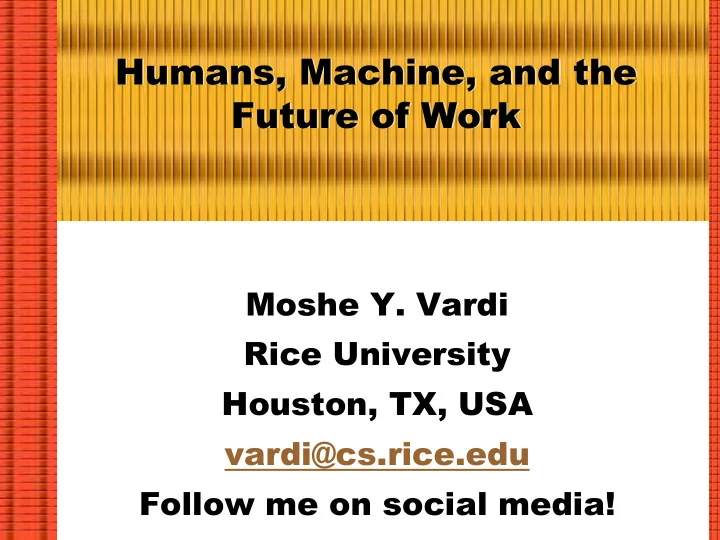

Humans, Machine, and the Future of Work Moshe Y. Vardi Rice University Houston, TX, USA vardi@cs.rice.edu Follow me on social media!
Where Are The Jobs?
The Great Coupling
The Great Decoupling
The Neoluddites J. Sachs and L. Kotlikoff : “What if machines are getting so smart, thanks to their microprocessor brains, that they no longer need unskilled labor to operate?“
The Neclassicals K. Rogoff: “Since the dawn of the industrial age, a recurrent fear has been that technological change will spawn mass unemployment. Neoclassical economists predicted that this would not happen, because people would find other jobs, albeit possibly after a long period of painful adjustment. By and large, that prediction has proven to be correct.”
The Debate in A Nutshell Neoluddites : “This time it is different.” Neoclassicals : “This time it is not different.” Who is right? Let’s go back to basics!
AI: Early Optimism 1958, H. A. Simon and A. Newell: "within ten years a digital computer will be the world's chess champion” 1967, M. Minsky: "Within a generation ... the problem of creating 'artificial intelligence' will substantially be solved."
“AI Winters” The first AI winter 1974−1980: slow progress and dearth of funding The second AI winter 1987−1993: the “Fifth - Generation bust” and dearth of funding
AI Breakthroughs, I 1997: IBM’s Deep Blue beats Kasparov.
AI Breakthroughs, II 2005: DARPA Grand Challenge - Stanford autonomous vehicle drives 131 miles along an unrehearsed desert trail.
AI Breakthroughs, III 2007: DARPA Urban Challenge - CMU autonomous vehicle drives 55 miles in an urban environment while adhering to traffic hazards and traffic laws.
AI Breakthroughs, IV 2011: IBM’s Watson defeats the two greatest Jeopardy! champions, Brad Rutter and Ken Jennings, by a significant margin.
The Robots Are Coming 2011 : “New UCSF Robotic Pharmacy Aims to Improve Patient Safety” 2011: “Japanese Robot Debones 1,500 Chickens Per Hour” 2012: “Meet South Korea’s New Robotics Prison Guards” 2013: “New Sedation Machine Promises Cheaper Colonoscopies; Doctors Fight Back” 2014: “Royal Caribbean's Quantum of the Seas Features a Bionic Bar with Robot B artenders”
Impact on Jobs 2012, E. Brynjolfsson and A. McAfee, Race Against The Machine: “ “Te chnological progress is accelerating innovation even as it leaves many types of workers behind ”
Decoupling in Manufacturing
Growing Inequality, I
Labor Force Participation
Wages vs. GDP
2014 Economists Opinion Poll “Information technology and automation are a central reason why median wages have been stagnant in the US over the past decade, despite rising productivity.” Agree: 43% Uncertain: 30% Disagree: 24% Strongly disagree: 4%
Popular Angst "More Jobs Predicted for Machines, Not People" “Will Robots Steal Your Job ?” "Marathon Machine: unskilled workers are struggling to Keep up with technological change" "It's a Man vs. Machine Recovery" "The Robots Are Winning", “The Rise of the Robots”.
The Big Question If machines are capable of doing almost any work humans can do, what will humans do? When? “Predictions are hard, especially about the future.” Say, 2045 Not near future Not too far future
This Time It May Be Different! Technology has been destroying jobs since the start of the Industrial Revolution, yet new jobs have continually been created. But we have never faced machines that may be able to outcompete us in almost everything! Thought experiment: Suppose that machines can do everything we can do. What is our comparative advantage?
Neoclassical Horses CGP Grey: Imagine a pair of horses in the early 1900s talking about technology. One worries all these new mechanical muscles will make horses unnecessary. The other reminds him that everything so far has made their lives easier: “Even if this car thingy takes off, there will be new jobs for horses we can't imagine .” Fact : The horse population peaked in 1915 -- from that point on it has been nothing but down.
Our Social Responsibility Turing , 1950: “We may hope that machines will eventually compete with men in all purely intellectual fields ... we can see plenty there that needs to be done .“ We cannot rush with technology without preparing for the consequences. We have done it with fossil fuels, and we cannot deal with the consequences.
Recommend
More recommend